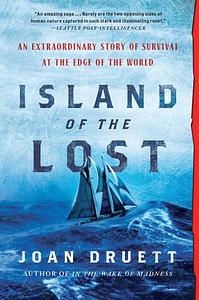You need to sign in or sign up before continuing.
Take a photo of a barcode or cover
Joan Druett hit upon a gold mine of material for her book "Island of the Lost: Shipwrecked at the Edge of the World." Two different boats shipwrecked on tiny, inhospitable Auckland Island, miles off the coast of New Zealand. Completely unknown to each other, the two crews really illustrate the difference between men who are driven to survive and men who have given up. One crew worked together (and admittedly had a gun that made a big difference for its food supply) while the other crew fell apart, with most dying, unable to even try helping themselves. The facts of these true tales are really interesting, though I wasn't a huge fan of Druett's storytelling -- especially in the first half of the book... she includes lots of details about the island flora and fauna but the manner of the telling kind of pulled away from the story. I liked the second half of the book better as the story really started to come together.
Interesting Story
The story was very interesting and I can't even begin to imagine what these men went through. I found myself wondering how they made it home safely and how long they were stranded but it wasn't written to draw the reader in emotionally.
The story was very interesting and I can't even begin to imagine what these men went through. I found myself wondering how they made it home safely and how long they were stranded but it wasn't written to draw the reader in emotionally.
adventurous
hopeful
informative
inspiring
fast-paced
Really wonderful account of the perseverance of the human spirit.
adventurous
challenging
dark
emotional
informative
inspiring
tense
medium-paced
Fascinating. Especially because SO MANY boats were shipwrecked here.
Imagine being such a good man that after being shipwrecked on an island for 600 days (starving, bitten, sick, boils all over) you go back TWICE to make sure you got any other survivors. I’m a piece of shit, I don’t think I’d do it.
A five star tale in a three star book. The start was too slow, too much background information. The middle wallowed in repetition that was unnecessary. The end again was too slow with too much ancillary detail. What the castaways of the Grafton managed to do was extraordinary. What one (Holding) of the castaways of the Invercauld managed to do was also extraordinary. What two of the Invercauld castaways did was not and they were very fortunate to have Holding around.
Takeaway from the book - few "modern" men would survive under similar circumstances. I know I wouldn't.
Takeaway from the book - few "modern" men would survive under similar circumstances. I know I wouldn't.
This story is completely nuts; two different ships wreck on the same island and thanks to questionably accurate journal keeping we have a lot of knowledge on how these two different crews survived. Druett does a great job of putting all the various accounts together in a very readable book. There were certainly parts that dragged as the details on some of the projects that the outcasts were working on could be a little slow but the ingenuity in their work and the will they had to keep working made it worthwhile. I'm glad that I was able to hold off on looking up details on the story because my curiosity for how they survived kept me engaged through the dull parts.
Great book about two different shipwrecks on the Auckland Islands in 1864-1865. Druett balances her two threads well, and they are such disparate experiences that they contrast strikingly. It's amazing what the crew of the Grafton was able to accomplish - I definitely see why Les Nausfrages (one of the memoirs written by a Grafton survivor - like a French version of Robinson Crusoe) was so well-received.
Content note: A great number of seals/sea lions are killed for food, often graphically. Cannibalism also happens.
Content note: A great number of seals/sea lions are killed for food, often graphically. Cannibalism also happens.


